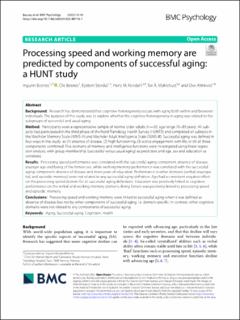Processing speed and working memory are predicted by components of successful aging: a HUNT study
Bosnes, Ingunn; Bosnes, Ole; Stordal, Eystein; Nordahl, Hans Morten; Myklebust, Tor Åge; Almkvist, Ove
Peer reviewed, Journal article
Published version
Permanent lenke
https://hdl.handle.net/11250/3047872Utgivelsesdato
2022Metadata
Vis full innførselSamlinger
- Institutt for psykisk helse [1312]
- Institutt for psykologi [3141]
- Publikasjoner fra CRIStin - NTNU [38688]
- St. Olavs hospital [2577]
Sammendrag
Background Research has demonstrated that cognitive heterogeneity occurs with aging both within and between individuals. The purpose of this study was to explore whether the cognitive heterogeneity in aging was related to the subgroups of successful and usual aging. Method Participants were a representative sample of normal older adults (n = 65, age range 70–89 years). All subjects had participated in the third phase of the Nord-Trøndelag Health Survey (HUNT3) and completed all subtests in the Wechsler Memory Scale (WMS-III) and Wechsler Adult Intelligence Scale (WAIS-III). Successful aging was defined in four ways in the study: as (1) absence of disease, (2) high functioning, (3) active engagement with life, or (4) all three components combined. Five domains of memory and intelligence functions were investigated using linear regression analysis, with group membership (successful versus usual aging) as predictors and age, sex and education as correlates. Results Processing speed performance was correlated with the successful aging component absence of disease, younger age and being of the female sex, while working memory performance was correlated with the successful aging component absence of disease and more years of education. Performance in other domains (verbal, visuospatial, and episodic memory) were not related to any successful aging definition. Age had a consistent negative effect on the processing speed domain for all successful aging definitions. Education was positively linked to cognitive performance on the verbal and working memory domains. Being female was positively linked to processing speed and episodic memory. Conclusions Processing speed and working memory were linked to successful aging when it was defined as absence of disease, but not by other components of successful aging, i.e. domain-specific. In contrast, other cognitive domains were not related to any components of successful aging.

